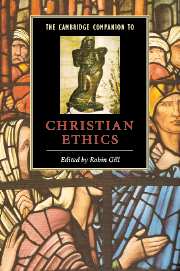Book contents
- Frontmatter
- Part I The grounds of Christian ethics
- Part II Approaches to Christian ethics
- Part III Issues in Christian ethics
- 12 Christianity and war
- 13 The arms trade and Christian ethics
- 14 Social justice and welfare
- 15 Ecology and Christian ethics
- 16 Business, economics and Christian ethics
- 17 World family trends
- 18 Christian ethics, medicine and genetics
- Select bibliography
- Index
12 - Christianity and war
from Part III - Issues in Christian ethics
Published online by Cambridge University Press: 28 May 2006
- Frontmatter
- Part I The grounds of Christian ethics
- Part II Approaches to Christian ethics
- Part III Issues in Christian ethics
- 12 Christianity and war
- 13 The arms trade and Christian ethics
- 14 Social justice and welfare
- 15 Ecology and Christian ethics
- 16 Business, economics and Christian ethics
- 17 World family trends
- 18 Christian ethics, medicine and genetics
- Select bibliography
- Index
Summary
Christianity teaches that the world is in a state of what it describes as 'fallen' disorder. There have been two classic attempts to understand why this is the case. The first, by Irenaeus, claimed that God intended it to be so that God's creatures could live lives of 'recapitulation' in which they constantly grew in grace. The second, by Augustine, claimed that human disobedience caused the disorder. Neither of these attempted explanations is satisfactory. Disorder and evil have to be lived with for the mystery they are. According to one biblical view, the state of conflict is represented by the 'principalities and powers' which are part of the created order (Rom. 8:38), and they are variously described in the Bible and its translations. Although they were among the 'all things' redeemed by Christ's death (Col. 1:20), they will remain in existence until Christ's return in glory. (1 Cor. 15:24). Only then will the struggle cease. This is a biblical way of describing the world's disorder. Human beings are part of this. They are seen as fallen creatures. Though they were created in and still bear the image of God as an alien dignity, their propensity to sin manifests itself in all that they do. Nothing remains untainted. Human beings are, however, the agents of God's grace in the world, but at the same time they remain part of its essential problem.
- Type
- Chapter
- Information
- The Cambridge Companion to Christian Ethics , pp. 171 - 182Publisher: Cambridge University PressPrint publication year: 2000
- 2
- Cited by

